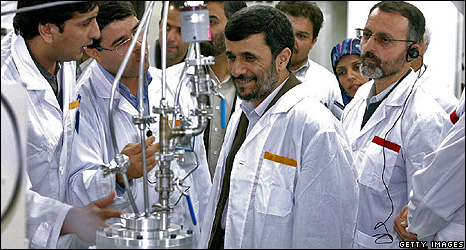
Iran plans to carry out the further enrichment at a plant monitored by the IAEA
|
By Paul Reynolds
World affairs correspondent BBC news website
|

Iran's announcement that it will further enrich its stock of uranium adds to suspicion of its ultimate intentions but leaves the United States and its allies as confused as ever. The Iranian move came only days after President Ahmadinejad spoke positively of a deal under which the further enrichment would be done abroad. There are still no answers to the questions: Does Iran intend to build a nuclear device one day? Is it simply acquiring some of the know-how so that it could do so? Is it, as it says, just developing the peaceful use of nuclear power, exercising its rights under the Non-Proliferation Treaty (though this is for the moment superseded by the demands of the Security Council and the UN's nuclear watchdog the IAEA that it stop all enrichment activities)? Or is it using its nuclear programme as a rallying-cry for the regime and to increase its international impact? As is so often the case with Iran, it has, with this latest move, increased its resistance but has fallen short of reaching the significant red line of enriching to weapons-grade standard. Medical reactor It has said that it will raise the level of its uranium enrichment only to a level not suitable for a nuclear weapon and only for a particular purpose. Specifically, it has said it will take some of the uranium it has enriched to the 3.5% level needed for nuclear power station fuel and will further enrich it to 20%, but not to the 90% needed for a useable nuclear bomb. One assumes it can do this, though the IAEA will have to verify it.
 |
URANIUM ENRICHED TO...
3.5%, Iran's current level, is used in nuclear power stations
20% is used in research reactors
90% and above is used in nuclear weapons
|
This plan, it says, would give it fuel to power a small nuclear reactor producing medical isotopes. The reactor has been operating in Tehran since 1968 (it was installed for the Shah by the Americans), but is running short of fuel. The current fuel for the reactor comes from Argentina. Last year Iran suggested getting more fuel from abroad but was instead offered a deal under which its low-enriched uranium was taken to Russia and France for conversion into the necessary fuel rods and returned. The idea was to get the bulk of the uranium out of Iran (it is currently simply stored) and allow time for negotiations. Iran has countered by offering to swap batches of low-enriched uranium for the fuel rods but on its own soil. It is afraid that otherwise it might not get back its stockpile, or any fuel rods, at all. Despite some promising noises, this deal remains undone. Iran still says it would not need to do the extra enriching if it got fuel from elsewhere. Arguments In Iran's favour, it can be stated that it does have a problem with the Tehran reactor and that it has repeatedly said that it will not build a bomb. The 20% enrichment, it also says, will be done at the Natanz plant, which is under IAEA monitoring. Against that, it is still defying the United Nations Security Council on total enrichment suspension and refuses to enter into talks about a long-term way of ensuring that its intentions are peaceful. There is an added loose-end this time. It is not clear how Iran could convert - and therefore why it is doing so - the 20% enriched uranium into fuel rods for the Tehran reactor as only France and Argentina can do that at the moment. Sanctions debate All this leaves the countries negotiating with Iran - the US, Russia, China, Britain, France and Germany - split as to how to react. The US, Britain, France and Germany want to increase sanctions, and aim them specifically at those involved in the nuclear work, but China has said no for the moment and Russia is uncertain. The hope is that a policy can be agreed by the time of a nuclear Non-Proliferation Treaty review conference in May. Israel seems willing at the moment to wait to see how the diplomacy works out and the US does not appear keen on military action. The chairman of the joint chiefs of staff, Admiral Michael Mullen, has recently stressed not only the instability that would result from Iran acquiring nuclear weapons but the instability that would result from an attack on Iran. Paul.Reynolds-INTERNET@bbc.co.uk
|

~RS~q~RS~~RS~z~RS~46~RS~)





Bookmark with:
What are these?